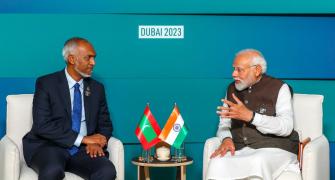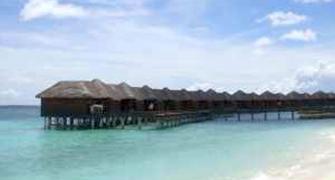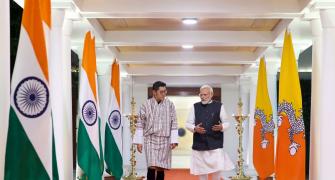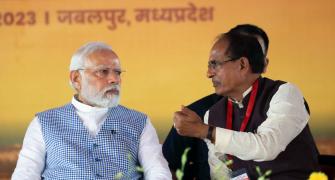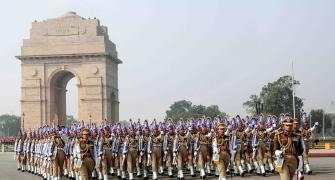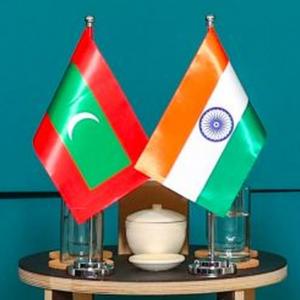'India should respect Maldivian nationalism and their desire to be not over-dependent on India.'

First, an anti-India tenor to Mohammed Muizzu's presidential election campaign in the Maldives. Then a boycott-Maldives social media campaign in India, followed by President Muizzu's visit to China.
During the visit, the Maldives signed not just agreements with China in tourism cooperation, disaster risk reduction, blue economy and investment in the digital economy, but also elevation of their bilateral ties to a Comprehensive Strategic Cooperative Partnership (CSCP).
What makes the small island so attractive to China?
Who gets upper hand in this situation? China or India?
"By signing the CSCP agreement with China, President Muizzu has sent a clear signal to India that the Maldives' dealings with India will be on a different plane than before," Colonel Ramani Hariharan, a retired military intelligence specialist on South Asia who is associated with the Chennai Centre for China Studies, tells Rediff.com's Shobha Warrier.
How did the anti-India campaign start in the Maldives?
Maldives is an archipelago of tiny islands with scant resources. This has made it totally dependent upon India for almost everything. This has been resented by sections of nationalists like Muizzu. He rallied the nationalists to launch an anti-India campaign during the election.
Maldives is a conservative Islamic society with the presence of strong radical Islamic elements. During the times of ISIS, Maldives had the highest per capita number of people joining the terrorist group.
Muizzu wanted to take advantage of both the radical Islamists and the latent anti-India feeling among the public unlike the earlier pro-Indian government of President Solih.
President Muizzu, even during his first foreign visit to Ankara in Turkey, was trying to whip up Maldivian nationalism, rather than projecting the Islamic aspect.
He also visited the UAE to address Maldivian expats employed there. In Turkey also, he addressed the expats and asked them to project Maldivian nationalism.
I don't consider Muizzi merely used anti-India as a slogan to get elected. He is fully aware the Maldives cannot exist without India's support. But he is trying to reduce the over-dependence of the Maldives upon India for everything.
Though he is importing some rice from Turkey, the UAE and Pakistan, India will continue to be the main source of rice imports.
Maldives also imports sand from India, which is essential for the reclamation of land, and India is the nearest source. The harsh reality of the Maldives is that the highest point in the country is just 18 inches above sea level.
The island nation cannot wish away these harsh realities..

Is China's interest in the Maldives because it is close to India?
Not at all. China doesn't see India as a main factor in the Indo-Pacific, though India may look at China that way.
China under President Xi Jinping is on an international power projection. After all, it is the second most powerful economy in the world. So, it wants to assume its place in the world to match that image.
That's why China is talking about a New World Order. The Belt and Road Initiative and the 21st century Maritime Silk Road are infrastructure initiatives for China's strategic power projection.
Maldives is astride international the shipping route of the Indian Ocean. As many as 15 ships pass through the Maldives channel every minute.
That is one reason China is wooing the Maldives. In 2014 itself, two years after coming to power, Xi visited the Maldives as it was an important part of China's domination of Indian Ocean security.

So, to expand its economic power, China needs countries like the Maldives. Does that mean, the importance of smaller countries increases because of their strategic location?
Economic power is one of the factors that dictate international politics. Politics is also run like a profitable business and all that you see in business, you see in politics. And the geographic location of a country plays an important part in it.
The Maldives is also important in the overall scheme of Indo-Pacific security, because a US base is located in Diego Garcia. It is an island claimed by Mauritius and is 700 km from the Maldives.
That's one reason why China would like to have a friendly Maldives.
That is also why we should not see everything happening in the Maldives from an anti-India, pro-China angle.
You talked about Indian tourists boycotting Maldives, but it had more tourists from China than India during the pre-covid days. It shows how important China is to the Maldives.
Moreover, China has invested a lot in tourism in the island. As a part of the BRI initiative, China has also invested enormously in infrastructure projects in the island nation.
Also, Maldives' debt to China is $1.7 billion, which is 20% of its public debt.
The next debtor is Saudi Arabia which includes loans, grants, real estate and religious activities. The third largest debtor is India.
The most important advantage the Maldives has is, it is geographically positioned like a 'toll gate' between the western Indian Ocean chokepoints of the Gulf of Aden and the Strait of Hormuz on one hand, and on the other, it also connects the Strait of Malacca in the eastern Indian Ocean.
But unlike other neighbouring nations like say, Sri Lanka, the Maldives is very much dependant on other countries. For example, there is no fresh water in the Maldives. Once when they ran out of water, India sent a naval ship with fresh water.

Why has the island turned against India?
They have not turned against India; they are trying to reduce its over-dependence on India.
Muizzu is using this as a political ploy. It is not the first time a president is getting elected on an anti-India platform. His mentor Abdul Yameen also got elected on an anti-India platform. After he was thrown out due to corruption, the next president was elected on a pro-India platform.
They want to replace its dependence on India to a certain extent with China. That's why Muizzu is seeking China's help in many areas in the island.
By signing the CSCP agreement with China, President Muizzu has sent a clear signal to India that the Maldives' dealings with India will be on a different plane than before.
Muizzu said that the majority of the sea routes of the Indian Ocean pass through or in proximity to the Maldives, and that securing sea lanes of communication was as vital to the Maldives as it was to the wider Indian Ocean region, global trade and commerce.
He wanted the Maldives to be contributing in the discussions and discourses on Indian Ocean security; not as an observer, but as an active partner in upholding a rule-based international order.
In short, he wants the Maldives to be treated on par with big powers like India and China.
But the fact is, it cannot just wish away India, its closest neighbour.
So, my point is, we should not look at India-Maldives relations as anti-India or pro-China.
India should respect Maldivian nationalism and their desire to be not over-dependent on India. India should not behave like a big brother towards Maldives as many times, we tend to behave like that.
The fact is, for regional security, the Maldives is an important component. In the army, we call the frontline forces, vanguard. If Sri Lanka is the vanguard for India in land, Maldives is India's vanguard for maritime security.
So, a prosperous Maldives is in Indian interests.
So, you should not see India-Maldives relations in the binary of China-India relations.
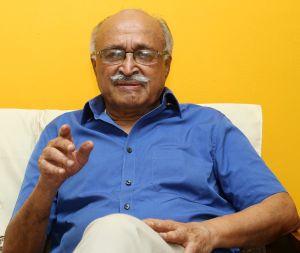 IMAGE: Colonel R Hariharan
IMAGE: Colonel R HariharanDoes the Maldives need India more, or does India need Maldives more?
Of course, the Maldives needs India more as it is a small island country, and India has been providing the wherewithal.
My point is, India should not behave like a patriarch. India should not have a big brotherly attitude.
Why did Xi Jinping go to Maldives in 2014? Because he knew the importance of the island as vital for China's strategic power projection.
For the same reason, it is important for India also. In fact, it is more important for India as we are close neighbours.
Feature Presentation: Aslam Hunani/Rediff.com

